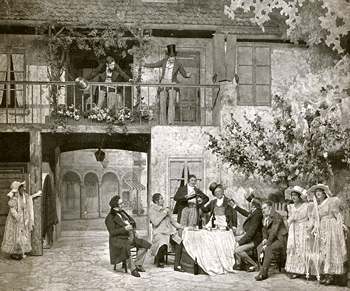Little is heard of this
lesser French composer/arranger. Berté produced a series of
mediocre operettas before adapting Franz Schubert's Viennese
music to produce an operetta based on social and romantic
interludes in Schubert's life. The show was adapted for opening
in London a year later
as Lilac Time, and later still in New York as Blossom
Time. In the London version produced by Dion Boucicault, a few characters
were changed: the three daughters of Mr. Veit were changed
from Annette, Jeanette and Nanette to Tilli, Willi and Lili,
for example. Minor changes in Lilac Time from Berté's
music were carried out by G.H. Clutsam. All three productions
were a success with plots essentially the same, and all circa
1826.

Of the singers, Aimé Doniat
and Lina Dachary complement each other admirably in their
Act I duet, with Doniat displaying tenderness and good legato.
The trio Annette, Jeanette and Nanette have a pleasant balance
to their important trio, while secure singing from Gaston
Rey and Germaine Parat (M. & Mme. Muhl) reveals warmth
and passion in their Act II duet.
Perhaps Berté’s finest
contribution is his adaptation of Schubert's delightful Rosamunde
music for a choral number and an episode in Act II. Its
choral setting is excellent. Many of the songs tend to be
unfamiliar until one gets to the chorus/reprise. Those who
know Schubert songs inside out may well be more aware of threads
that are not immediately obvious. Berté’s orchestration is
more than adequate to enrich the singing. With a sizable cast
list one can expect much variation in style, and this tends
to be the case. Few of the characters are provided with solo
contributions, however. As with other Opérette productions,
there are substantial passages of French dialogue; up to six
minutes on one track. Welcomed by speakers of the language,
who can follow the continuity of the piece, it can become
tiresome for other listeners. Disc timings seem to match those
of a double LP and it is a pity that the full Overture, Prelude
to Act II and the Dance of Bridesmaids and children are omitted
in this recording.
The notes are provided
only in French.
Raymond J Walker
BUY NOW
AmazonUK

